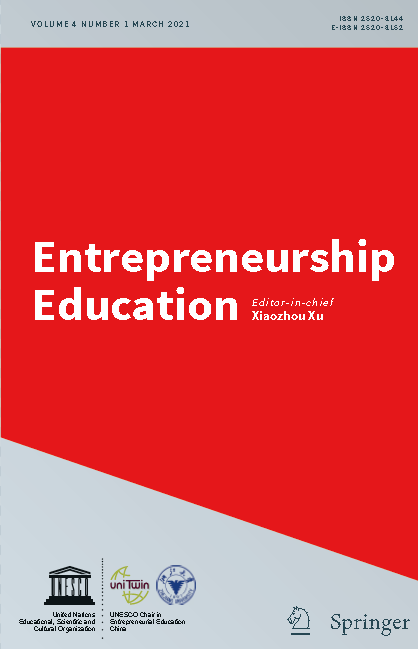
Date: 2021-04-06 Visitcount: 136

The journalEntrepreneurship Education brought out its Volume 4, Issue 1 with five articles on entrepreneurship education in this March This journal is the first English academic journal concerning entrepreneurship education in the Asia Pacific region. It is jointly founded by UNESCO Chair in Entrepreneurship Education at Zhejiang University and Springer.

Prof. Xiaozhou Xu, the Chair-holder of UNESCO Chair in Entrepreneurship Education at Zhejiang University, serves as the editor-in-chief of the journal. Arne Carlsen, former director of UNESCO Institute of Lifelong Learning, serves as the associate editor. Members of the editorial board are from universities and institutes in the United States, the United Kingdom, Germany, Australia, South Korea, Denmark, India, Croatia and other countries.
This journal is dedicated to exchanging the latest academic research and practical findings on various aspects of entrepreneurship education. It serves as a forum for the exchange of ideas among academic researchers, policy makers, and entrepreneurs, in order to explore practical experience and summarize theoretical reflections. The journal draws on high-quality work in social sciences, particularly in education, with an interdisciplinary and peer-reviewed approach. The journal primarily focuses on entrepreneurship education with a wide spectrum of sub-fields such as innovative education, technical and vocational education and training, maker education, lifelong learning and skill development, social entrepreneurship, entrepreneurial universities, curriculum and instruction, policy and governance. It welcomes original research, review article, book review, and other types of manuscripts based on the method of international and comparison, policy analysis, case study, quantitative and qualitative study, etc.
Abstracts of the Five Articles
Article One: Underpinning the Entrepreneurship Educator’s Toolkit: Conceptualising the Influence of Educational Philosophies and Theory
Entrepreneurship educators can maximize the effectiveness of their delivery by having a firm grasp of the different educational philosophies and theories that underpin entrepreneurship education pedagogy and practice. A particular educational philosophical orientation underlies, directs, and drives educator practices and should align with what the teaching seeks to impart and achieve, and the roles the learners and educator play in the learning process. Whilst educators might not always be explicitly aware of their philosophical orientation, it will direct and drive their pedagogic practice and have implications for what they deliver, and how they deliver it. The benefits of bringing together different learning theories, philosophies, and approaches for entrepreneurship education has previously been posited in the literature. However, it has been highlighted that connections between educational theory and practice are limited, and that the field of entrepreneurship education could be advanced through providing links between education literature, theory, and learning. This paper advances the literature by linking educational philosophy and theory to entrepreneurship education and pedagogy in higher education. It discusses and highlights how behaviourism, cognitivism, constructivism, and humanism can be used to underpin and support learning in entrepreneurship education. This meets calls for the conceptualisation of how educational philosophies and theories can be integrated into entrepreneurship education to support learners.
Article Two: Entrepreneurship Education at Universities: Challenges and Future Perspectives on Online Game Implementation
The study explored the challenges and potential of online gamification to develop actionable recommendations for entrepreneurship pedagogy in the phase of ‘new normal’. This study applied an experimental game which the authors developed, and a mixed method was applied to the data sets collected from the students: an open-ended survey of 91 students and in-depth interviews with 23 students. It has been found that the students perceiving activities with gamifications are good learning stimuli in entrepreneurial classrooms as a first step; then, they found it effective to learn and deepen their understanding of theories and models as a second step after the gaming activities, which is a reverse approach from a traditional business education approach. Gamification enables students to think critically on game scenarios via participation in gamifications, which can be strengthened and embedded in their mind by theoretical learning which follows the gaming activities. The findings of the study provide a practical guidance for entrepreneurship pedagogists with ‘activities first’ which will be followed by theoretical learning.
Article Three: The Relationship between Individual Entrepreneurial Orientation, Network ties, and Entrepreneurial Intention of Undergraduate Students: Implications on Entrepreneurial Education
This study examined the factors that affect the entrepreneurial intentions of university students in a developing economy. Drawing from the entrepreneurial orientation discourse and network approach, the study investigated the effect of innovativeness, proactiveness, risk-taking, and network ties on students' entrepreneurial intention. The study was conducted using 720 students selected from both private and public universities in Ghana. Data were collected using an online survey and analysed with partial least squares structural equation modelling (PLS-SEM) approach. The findings reveal that individual entrepreneurial orientation dimensions of innovativeness, risk-taking, and proactiveness influence entrepreneurial intentions. Also, the study found that network ties have a statistically significant effect on students' entrepreneurial intention. The type of university moderates the relationship between network ties, risk-taking behaviour, and entrepreneurial intentions. The findings of the study contribute to the development of policy and entrepreneurial education to enhance students' entrepreneurial intentions. Specifically, the findings imply that students' entrepreneurial development efforts must focus on their level of risk-taking behaviour, innovativeness, proactiveness, and network ties.
Article Four: From Entrepreneurial Desirability to Entrepreneurial Self-efficacy: the Need for Entrepreneurship Education—a Survey of University Students in Eight Countries
This paper attempts to contribute to the growing theoretical and empirical literature on entrepreneurial intent among university students. It is argued that entrepreneurial desirability precedes entrepreneurial self-efficacy and measuring it and the relevant factors that may influence it would be valuable, if not a necessity, prior to planning entrepreneurial education in a specific context. The paper used the survey method. Over six thousand students from eight country-branches of a regional university responded. The paper seeks first to assess whether entrepreneurship as an activity is desirable and then find out whether the students support the idea of introducing entrepreneurship education and how they want it to be organised. The level of entrepreneurial desirability and of the call for introducing entrepreneurial education was very high in all countries and all colleges and among both genders. Some factors that may affect entrepreneurial desirability, and which may influence how entrepreneurial education is to be planned, have been identified and tested statistically. These factors are internal; associated with the individual, e.g., educational status and work experience, and external; pertinent to the wider societal context, e.g., gender and employment situation in the country. Entrepreneurial education in universities where the students had no prior exposure to it, it is suggested, is to focus mainly on developing entrepreneurial self-efficacy.
Article Five: Fostering Business Opportunity Identification Skills in Secondary Education via an Orchestrated Technology Enhanced Learning Script
Due to global economic and technological changes, Europe requires a greater number of young people who are willing and able to become entrepreneurs. Thus, there is a need for the provision of effective Entrepreneurship Education (EE) in high schools via validated well-structured instructional methods. Although business opportunity identification has been regarded as the starting learning objective for every educational approach on entrepreneurship, so far not great emphasis has been given on it within EE programs. This paper proposes a technologically enhanced instructional approach that specifically promotes high school students’ business opportunity identification skills, focusing on their entrepreneurial readiness and providing them with the opportunity to fill cognitive gaps using digital learning material in an online learning environment. This approach has been validated via a research study which was conducted in seven high school classes involving 168 students aged 14–16 years, examining its learning effectiveness and acceptability. The evaluation framework along with the positive quantitative and qualitative results is presented.
We sincerely invite researchers and practitioners in the field of entrepreneurship education to submit to our journal. Electronic ISSN:2520-8152, Print ISSN:2520-8144.
For more information, please contact:
Associate Editor:
Hao Ni, nh@zju.edu.cn
Assistant Editor:
Nian Wan, 470396996@qq.com
By Nian Wan

